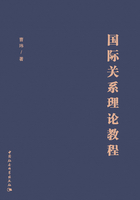
思考题
1.推动国际关系理论内部发生多次论战的主要原因是什么?
2.第二次论战和第四次论战的区别是什么?
3.后实证主义能够被看成是一个理论流派吗?

[1] 这是戴维·戴维斯(David Davies)为国际关系学科所确立的使命。1919年威尔士工业家戴维斯在威尔士阿伯斯威大学资助建立了国际政治系,并为国际政治专业设立了以伍德罗·威尔逊命名的第一个讲席教授。
[2] Gilbert Murray,The Ordeal of this Generation:The War,the League and the Future,London:George Allen and Unwin,1929,p.29.
[3] Woodrow Wilson,“Joint Address to Congress Leading to a Declaration of War Against Germany,” Senate Document,No.5.1917,https://www.archives.gov/historical-docs/todays-doc/?dod-date=402.
[4] Norman Angell,The Great Illusion:A Study of the Relation of Military Power in Nations to their Economic and Social Advantage,New York and London:G.P.Putnam's Sun,1910.
[5] Hedley Bull,“The Theory of International Politics,1919-1969,” in James Der Derian ed.,International Theory Critical Investigations,London:Macmillan Press LTD,1995,p.185.
[6] [英]爱德华·卡尔:《20年危机(1919—1939):国际关系研究导论》,秦亚青译,世界知识出版社2005年版,第8页。
[7] “利益和谐论”指的是“个人追求自我利益的同时,也帮助了社会利益的实现;而促进社会利益的同时,也就促进了个人利益的实现”。参见[英]爱德华·卡尔《20年危机(1919—1939):国际关系研究导论》,秦亚青译,世界知识出版社2005年版,第43页。
[8] [英]爱德华·卡尔:《20年危机(1919—1939):国际关系研究导论》,秦亚青译,世界知识出版社2005年版,第98页。
[9] [美]汉斯·摩根索:《国家间政治:权力斗争与和平》(第七版),徐昕、郝望、李保平译,北京大学出版社2006年版,第28页。
[10] [美]汉斯·摩根索:《国家间政治:权力斗争与和平》(第七版),徐昕、郝望、李保平译,北京大学出版社2006年版,第62页。
[11] Hedley Bull,The Anarchical Society,New York:Columbia University Press,1977,p.xiii.
[12] [美]詹姆斯·多尔蒂、小罗伯特·普法尔茨格拉夫:《争论中的国际关系理论》第五版,阎学通、陈寒溪等译,世界知识出版社2013年版,第39页。
[13] Hedley Bull,“International Theory:The Case for a Classical Approach,” World Politics,Vol.18,No.3,1966,p.361.
[14] [加]罗伯特·杰克逊、[丹]乔格·索罗森:《国际关系学理论与方法》,吴勇、宋德星译,中国人民大学出版社2012年版,第245页。
[15] James N.Rosenau,The Scientific Study of Foreign Policy,London:Francis Pinter,1980,p.7.
[16] Hedley Bull,“International Theory:The Case for a Classical Approach,” World Politics,Vol.18,No.3,1966,p.365.
[17] Klaus Knorr and Sidney Verba,eds.,The International System:Theoretical Assays,Princeton:Princeton University Press,1961,p.16.
[18] John Vasquez,The power of Power Politics,Cambridge:Cambridge University Press,1998,p.212.
[19] [美]罗伯特·基欧汉:《霸权之后:世界政治经济中的合作与纷争》,苏长和、信强、何曜译,上海人民出版社2006年版,第107页。
[20] [美]罗伯特·基欧汉:《霸权之后:世界政治经济中的合作与纷争》,苏长和、信强、何曜译,上海人民出版社2006年版,第12—13页。
[21] 秦亚青:《权力·制度·文化》,北京大学出版社2005年版,第21页。
[22] [加]罗伯特·杰克逊、[丹]乔格·索罗森:《国际关系学理论与方法》,吴勇、宋德星译,中国人民大学出版社2012年版,第252页。
[23] Robert Cox,“Social Forces,States and World Order,” in Robert Keohane ed.,Neorealism and Its Critics,Columbia:Columbia University Press,1986,pp.204-254.
[24] J.Ann Tickner and Laura Sjoberg,“Feminism,” in Tim Dunne,Milja Kurki,and Steve Smith,eds.,International Relations Theories:Discipline and Diversity,3rd Edition,Oxford:Oxford University Press,2012,pp.205-222.
[25] Richard K.Ashley,“The Geopolitics of Geopolitical Space,”Alternatives:Global,Local,Political,Vol.12,No.7,1987,p.408.
[26] Robert Keohane,“International Institution:Two Approach,” in James Der Derian ed.,International Theory Critical Investigations,London:Macmillan Press LTD,1995,p.302.
[27] [美]亚历山大·温特:《国际政治的社会理论》,秦亚青译,上海人民出版社2008年版,第22页。
[28] Steve Smith,“Introduction,” in Tim Dunne,Milja Kurki,and Steve Smith,eds.,International Relations Theories:Discipline and Diversity,3rd Edition,Oxford:Oxford University Press,2012,p 7.